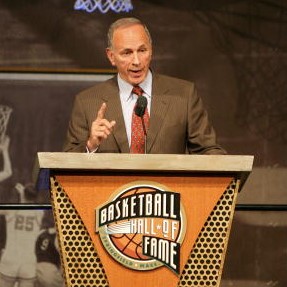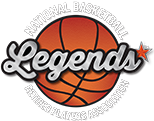Hoop du Jour 2.0
By Peter Vecsey

I've been referred to as many things and in many ways over the decades.
Shockingly, some of the things that were said, written, threatened, intimated, deposed, attached to a brick, contract hit, etc., were not always warm and fuzzy...
...and that was just from friends and family.
I've been given names that wouldn't cut it in the family hour, not even if the family was Manson.
What I've never answered to, however, is the nom de plume I'm now giving myself...
...Lazarus of the Laptop, because I've returned.
In a year where nothing's gone right, allow me to multiply the misery.
Displaying marginal sense, the good folks at the NRBPA and I have decided to dust Hoop du Jour for prints, reprising all the wit, wisdom and snark, though now with 40 percent less cholesterol.
Knowing where my whole grain bread is I-Can't-Believe-It's-Not-Buttered, I'm gearing this incarnation of HDJ to the NRBPA's rank and vile.
Toward that end, Uncle Petey wants your stories, your ideas, your pickpockets of knowledge.
Gimme the funny, the frivolous, the poignant, the pithy, either from yesterday or yesteryear.
I don't care if your ankle bracelet now matches your MedicAlert bracelet. That's not what I want to write and that's not what your brethren want to read.
Reach out me at pvecsey@legendsofbasketball.com.
Together, we can make this go-round of Hoop du Jour something truly worthwhile to write and read.
First time for everything.
*****
Looking forward to receiving updates on your lives after active pro duty, preferably by phone, so we get to know each other better, or for the first time. I want this blog primarily to tell stories you’re comfortable sharing, short or long, sad or upbeat, old or present.
I want young fans to recognize your names and discover how your careers began, at a time (for many players above 60) when there was maximum competition for a minimum amount of jobs…when players needed off season work to stay one step ahead of bill collectors.
I want young fans to understand what they’re witnessing in wonderment, for the most part, is nothing new.
I want young fans, and the portion of the media that seemingly believes the NBA started in 1979 when Magic Johnson and Larry were drafted, or in 1984 when Michael Jordan was a rookie, or, more troubling, when Kobe Bryant (1996) and then LeBron James (2003) arrived in force, to acknowledge and appreciate your contributions to the game… for building its current financial and global success.
In the meantime, until this blog gains momentum, I offer some stories to give an idea of what I’m hoping to harvest.
*****
Dave DeBusschere was one of a limited number of exceptional athletes to play professional basketball (Pistons & Knicks) and baseball (White Sox). After he retired, No. 22 would occasionally participate in evening pickup games at assorted borough gyms.
One night, an elderly janitor was sweeping up at one end of the floor while six of us played at the other.
“I know who you are,” the janitor, pointing at DeBusschere, suddenly shouted, 20 minutes into the workout. “I know who you are.”
This went on sporadically for about ten minutes. Finally, DeBusschere turned toward the guy and said, “OK, who am I?”
“You pitched for the White Sox,” the janitor replied.
I laughed out loud when Phil Jackson referred to Dennis Rodman as a maverick in a segment of The Last Dance. Who else remembers that ‘Maverick’ was the title of Jackson’s first book of many authored by Charley Rosen? Though I covered the Knicks for several seasons while Jackson was still active, my last name was butchered in the book. Not to mention my street cred was seriously questioned. Jackson accused me of thinking only black players could play.
When Willis Reed was Nets GM, I surprised him after a game with a framed photo of him sitting alongside Jackie Robinson. They had been judges at a beauty contest. Reed got emotional. He had never seen the photo. Naturally, I had a duplicate on hand and asked him to sign it. That photo is part of my photo shrine to Jackie, whose treasured autograph was placed in the frame along with two 1956 World Series tickets.
When southern born and raised Larry Kenon turned pro after Bill Walton destroyed Memphis State (44 points on 21-22 from the field, plus 13 rebounds) in the NCAA title game won by UCLA, he came to New York for the summer and played for my team at Rucker Park. We were walking in my downtown neighborhood one day when Kenon stopped at a blacktopped playground to watch a softball game. He was both hypnotized and mystified. What’s the matter, I asked. After a couple second pause, he replied, “How do they slide?”
If not for Super John Williamson’s second half exploits in Game 6 of the Finals (16 of his 28 points were amassed in the fourth quadrant; Julius Erving did not score a field goal in the 12 minutes), the series would’ve shifted to Denver and the Nuggets very likely would’ve beaten the Nets.
As a rookie, the self-anointed ‘Super John’ beat out George Bruns (based on a one-on-one match, arranged by Kevin Loughery) for the fourth guard spot on the roster. Following a 9-game losing streak, which followed four wins to start the season, Loughery replaced John Roche with Williamson in San Antonio. At some point during the first quarter, Rich Jones, a certified rough customer, welcomed Super John to the league by ‘bowing him in the back of the head. A few minutes later, the 6-9 forward got worse from the 6-4 Williamson. The losing streak ended. “What goes around, comes around,” Super John said in the locker room. It was the first time I’d heard the biblical expression.
After Rod Thorn, a Nets assistant under Loughery, had been Bulls GM for a while, he hired his long time buddy (they’d also played together in the NBA) to coach. The previous season, Reggie Theus had averaged 23 points and made the All Star team. Chicago fans adored him. Loughery immediately benched him, thus terminating his consecutive-game playing streak at 429. Except for a couple minutes here and there, until the mid-February trade deadline nearly expired, at which time he was shipped to the Kings for Steve Johnson, Theus was kept in dry dock.
To this day, nobody (other than Loughery) knows a reason for the coldblooded decision. Was it because Reggie held out for two weeks? Was Theus’ defense deficient? Was it because ownership interfered by expressing disapproval to the media? Or were the fans responsible for constantly chanting, “We want Reggie”?
“What a shame,” Theus told me recently. “I was fifteen minutes away from playing with Michael Jordan the next season. Hey, I could’ve been John Paxson.”
When Rick Barry played for the Warriors, his four sons often got to be ball boys. It was Brent’s turn on this particular night when Rick became outraged about something or other and got ejected. As he was leaving the court he grabbed Brent around the waist and carried him toward the locker room. Brent, eight or nine, loudly protested. “Put me down! You got thrown out of the game, not me!”
Billy Paultz once told me that when Wes Unseld turned his back on him under the basket it was like playing against a handball court. In 1978, the Bullets beat the SuperSonics in seven games. It was the franchise’s one and only championship. Unseld converted a crucial missed shot of his to take the lead and iced matters with two critical free throws after missing a pair shortly before. Brian McIntyre, the league’s PR director, asked me to vote along with four other members of the media for the MVP award:
Unseld and Elvin Hayes both had two votes when I verbally cast mine for the handball court.
Years later, Unseld, one of two players ever to win the NBA’s top rookie award and MVP in the same season (Chamberlain is the other) told me he didn’t feel appreciated. “But I stopped trying to please people long ago. All I cared about was that I was making a living.”
In that case, I informed the captain of the All Worst Interview Team, you owe me a few good quotes because my vote broke a 2-2 deadlock in Sport Magazine’s MVP balloting in the 1978 playoffs. “You got a new car and a better contact.”
“Owe you? I’m mad at you!” Unseld retorted. “Because of you, I’m in a higher tax bracket.”


